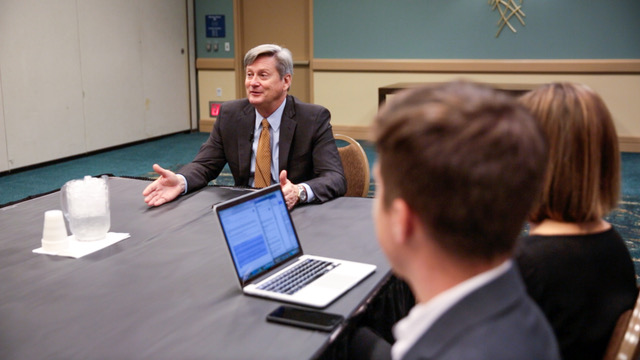Unsettled Questions Convene at NAHC
A think tank of post-acute care professionals met in California October 15-17, 2017. They were looking for solutions and support for their work challenges.
New rules, regulations, Medicare and Medicaid reimbursement and documentation pressures are already disrupting businesses as mission-critical clinicians anticipate the training and fulfillment needs and responsibilities that the changes will bring to their staffs. There’s much to be done in the administration and follow-through of home health and hospice care.
Unsettled questions repeat themselves. Will the Conditions of Participation (CoPs) be postponed? Will the Home Health Groupings Model (HHGM) retreat? Similar answers persist. Call Washington.
 Bill Dombi, interim president of NAHC (Photo courtesy of Axxess)
Bill Dombi, interim president of NAHC (Photo courtesy of Axxess)Basically, we won’t know until we know, says Bill Dombi, interim president for the National Association for Home Care and Hospice (NAHC). NAHC and its stakeholders are waiting to hear what relief might come. They hope help will come soon or at least more will be known about the expectations when the long-awaited interpretive guidelines related to the CoPs come out in December.
The toughest part of the HHGM—the proposed payment rate cut and redesign—came swiftly and unexpectedly, Dombi told a group of us on the last day of his organization’s national conference October 15-17. Dombi warned that such changes, should they succeed, will likely trigger not-so-favorable behavioral changes among organizations, and this he described could change the patient experience in one way or another. Dombi cited hospitals’ use of observational status as an alternative to inpatient status, for example, and if you look, you will find what troubles have come from this.
NAHC’s national conference was filled with software providers ready to make coding, billing and reimbursements go better for post-acute care providers. Accreditors and educators attended, some DME wranglers, as well as consultants, recruiters and much more. The vendors I talked to said they benefited from quality conversations.
The providers I talked to looked for answers, insights and solutions. One clinician from the Midwest said she hoped to connect with a tool to quickly retrieve electronic documents as part of a record review request. Another from a nonprofit health system said she is trying to help teams understand the business and financial principles that affect her system’s overall health and performance as “the rules keep changing.” She and her team are studying workflows and working toward efficiencies. That’s a good thing.
There will be studies looking at the efficiencies of the home health experience, said Charles Canaan senior provider education consultant for Palmetto GBA, during Palmetto’s Jurisdiction M MAC update, one of the handful there. Canaan stressed the importance of a detailed process for record collecting. Leaving anything out of the response will have its consequences. The bottom line: If a patient is still on the service, all details as to “why” will be eyeballed to make sure the service is medically necessary.
Education sessions ranged from alphabet soup (all of those industry acronyms that help keep programs organized), the care continuum and clinical matters to business development, leadership and finance, as well as hospice, palliative care and private duty directions, innovations and the heaviest hitters–quality and regulatory. NAHC’s Conference App made session handouts and attendee networking easy peasy for reference and follow-up.
 Education session at NAHC (Photo courtesy of Axxess)
Education session at NAHC (Photo courtesy of Axxess)Hot topics started at quality with John O’Leary’s Quality at Home session being one of the most talked about for its inspiration. O’Leary was given a one percent chance to live after suffering burns over his entire body when he was 9 years old. He spoke to “the power of one” and quality care at home.
Other keynote speakers included Laura Adams on the quality of care. Adams is president and CEO of the Rhode Island Quality Institute, the nonprofit agency that in 2015 won an $8 million federal grant for statewide efforts to expand the use of electronic medical records, collect and analyze data, and spend health-care dollars more efficiently. Adams serves on the Rhode Island Governor’s Workgroup on Healthcare Innovation.
Juliet Funt, owner and founder of WhiteSpace at Work, spoke on quality at work and the difference between being busy and being truly productive. Funt is a nationally recognized expert on workplace improvements that lead to more creativity and increased productivity.
If you attended the NAHC conference, let's connect—ecarey@cahabamedia.com.
